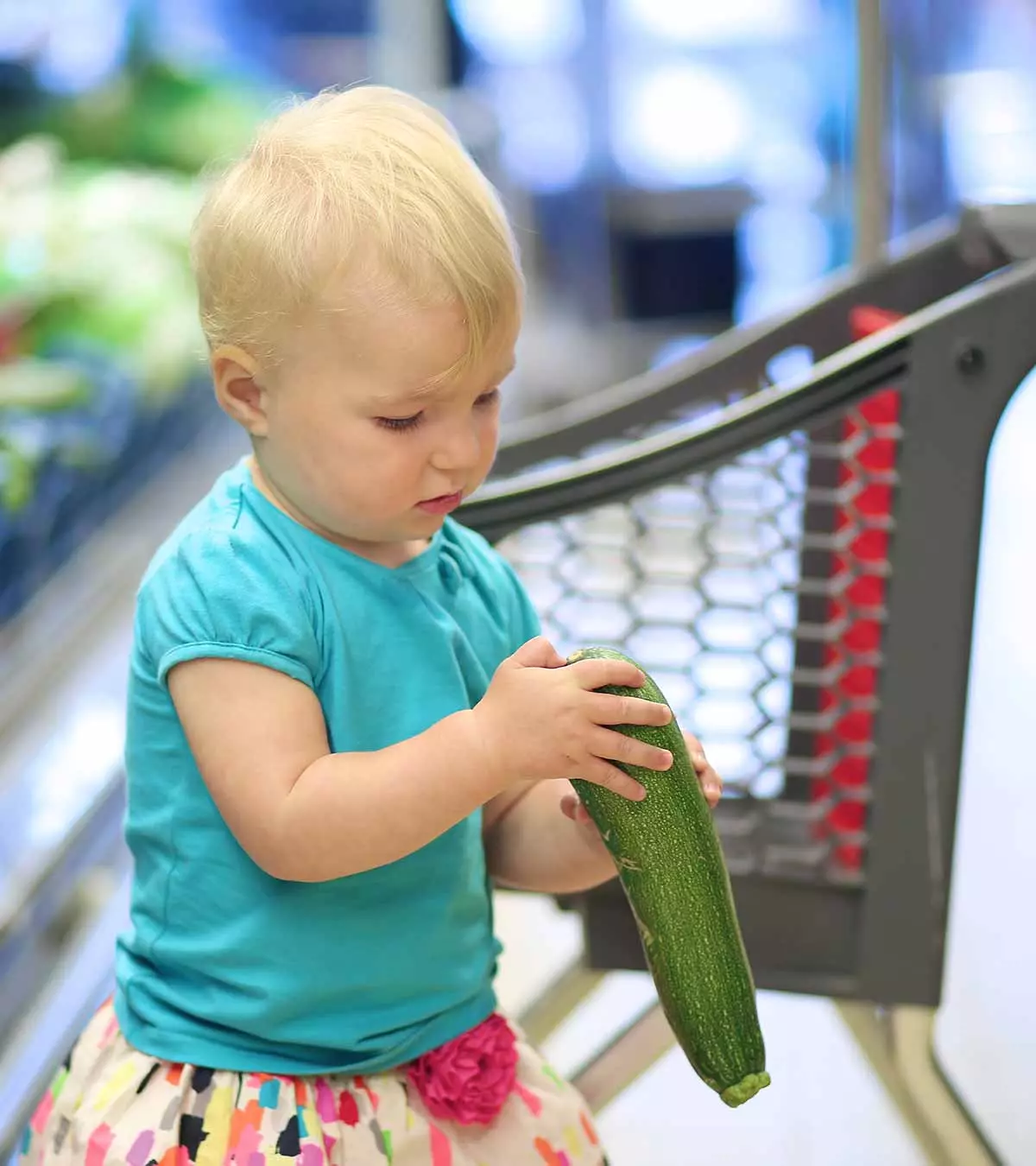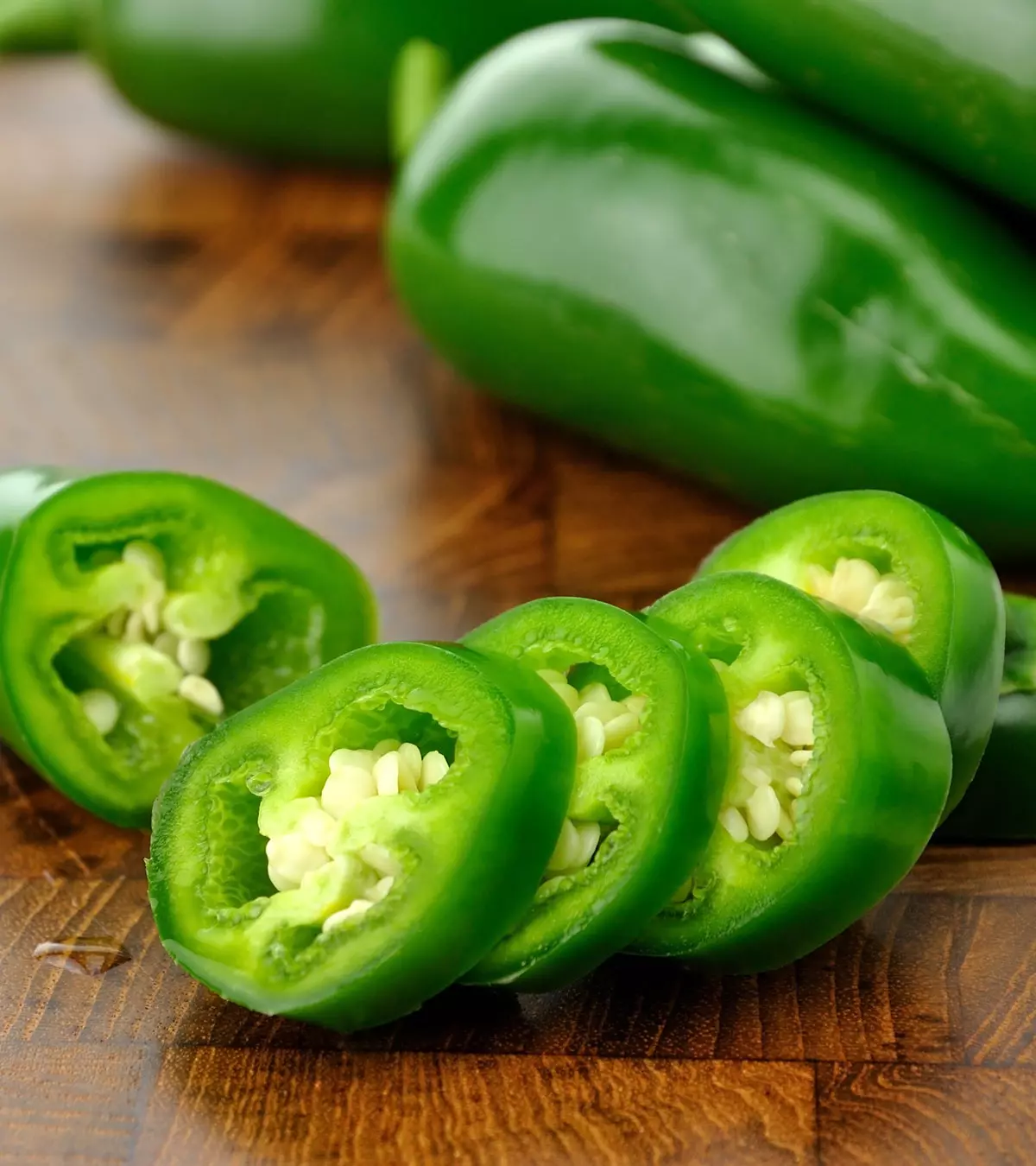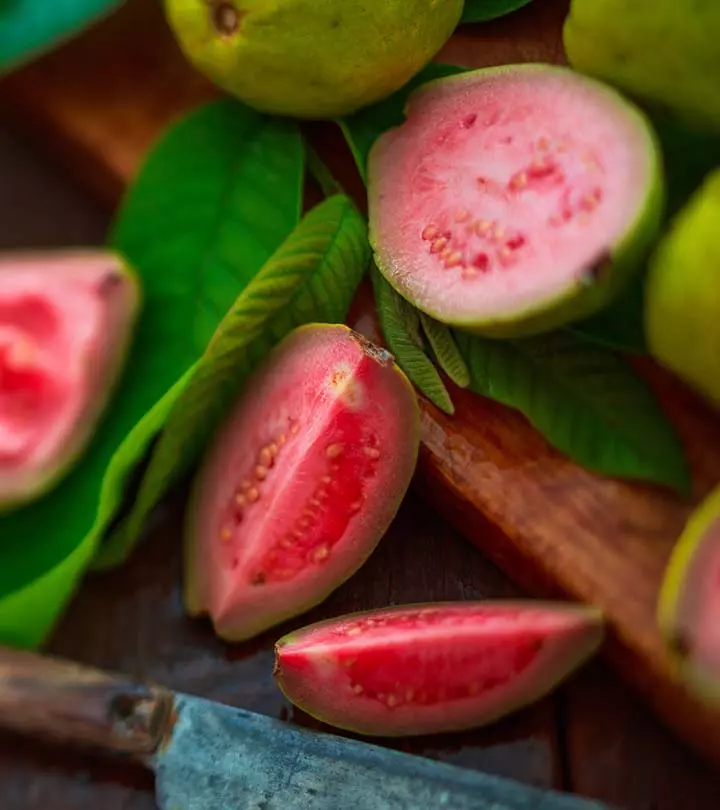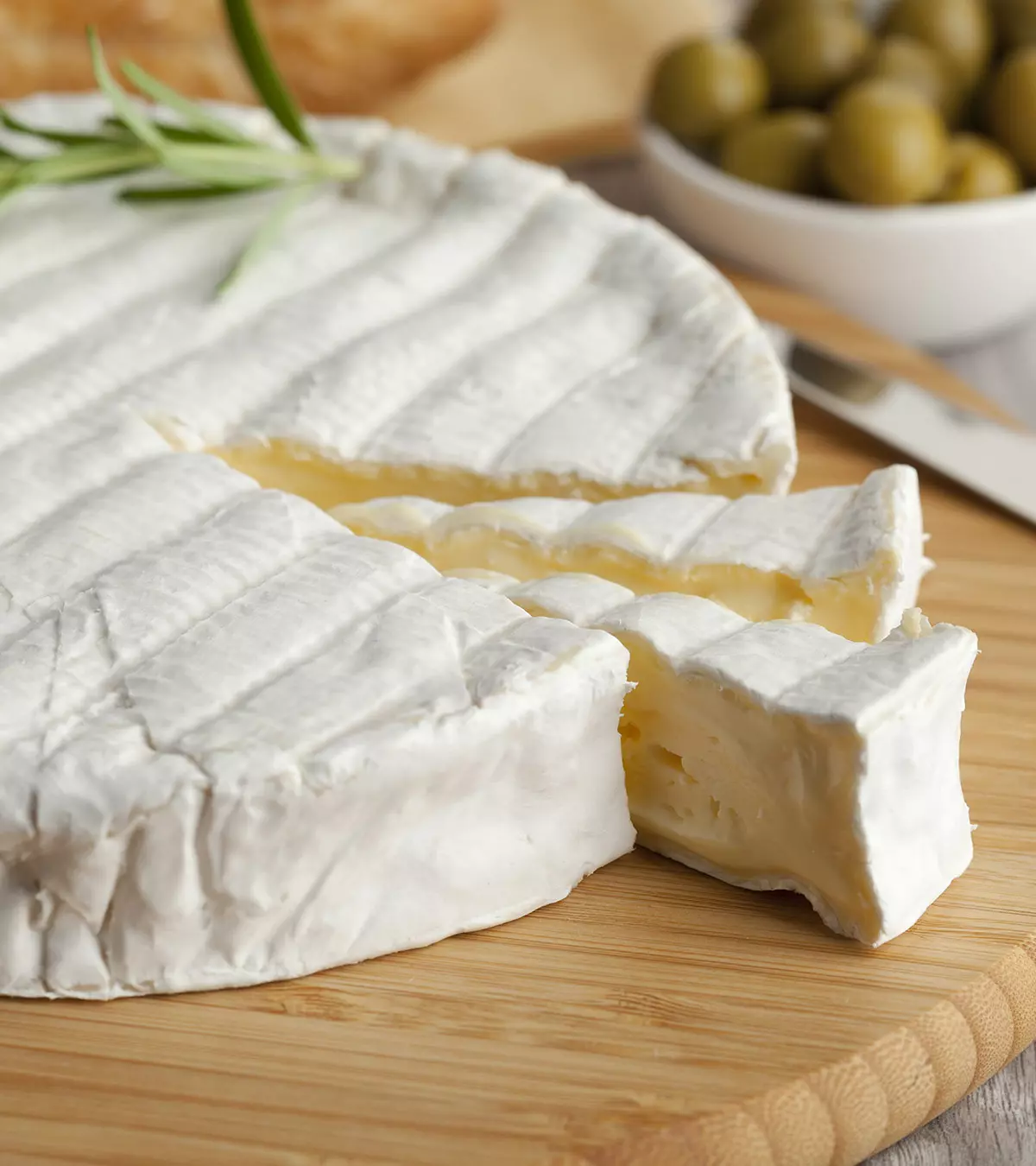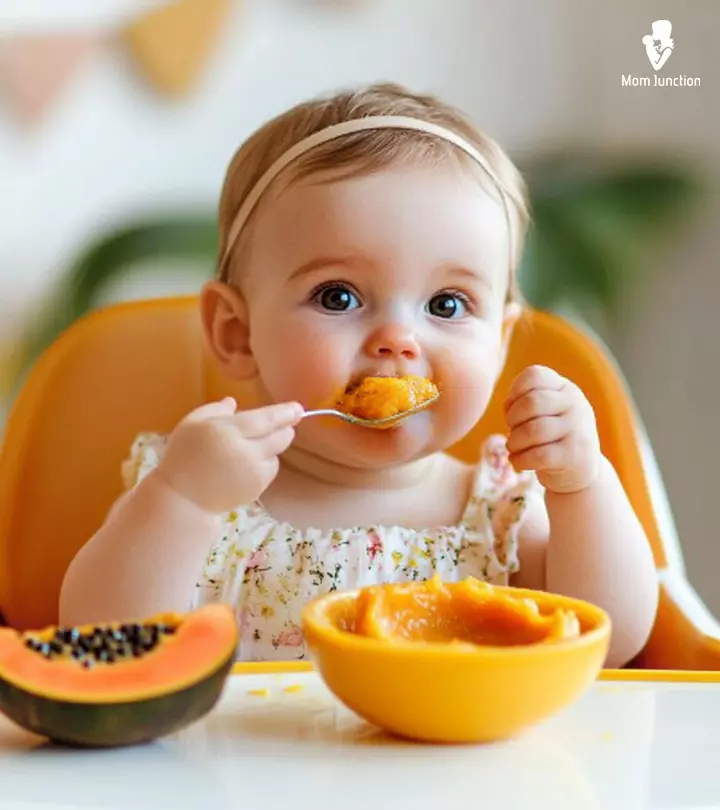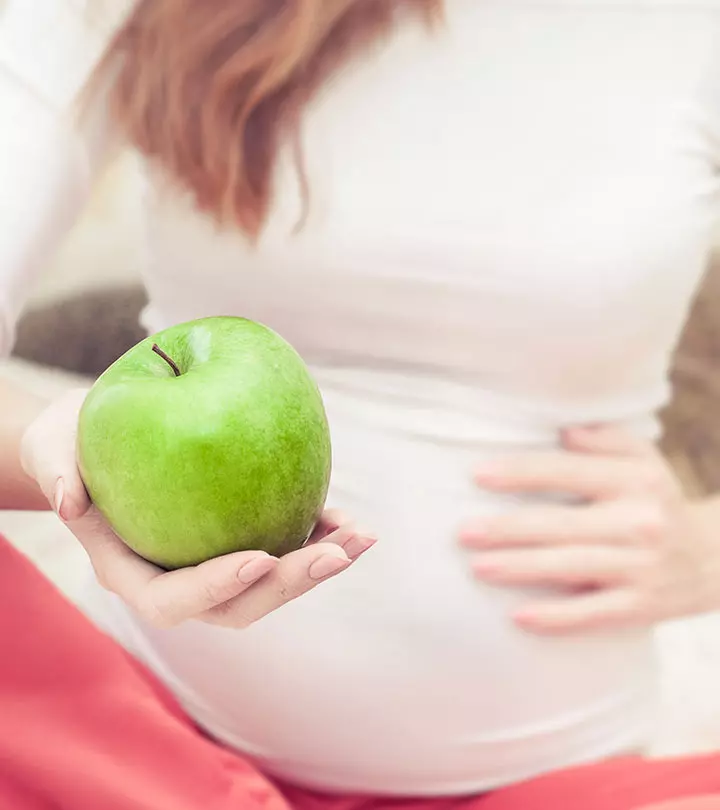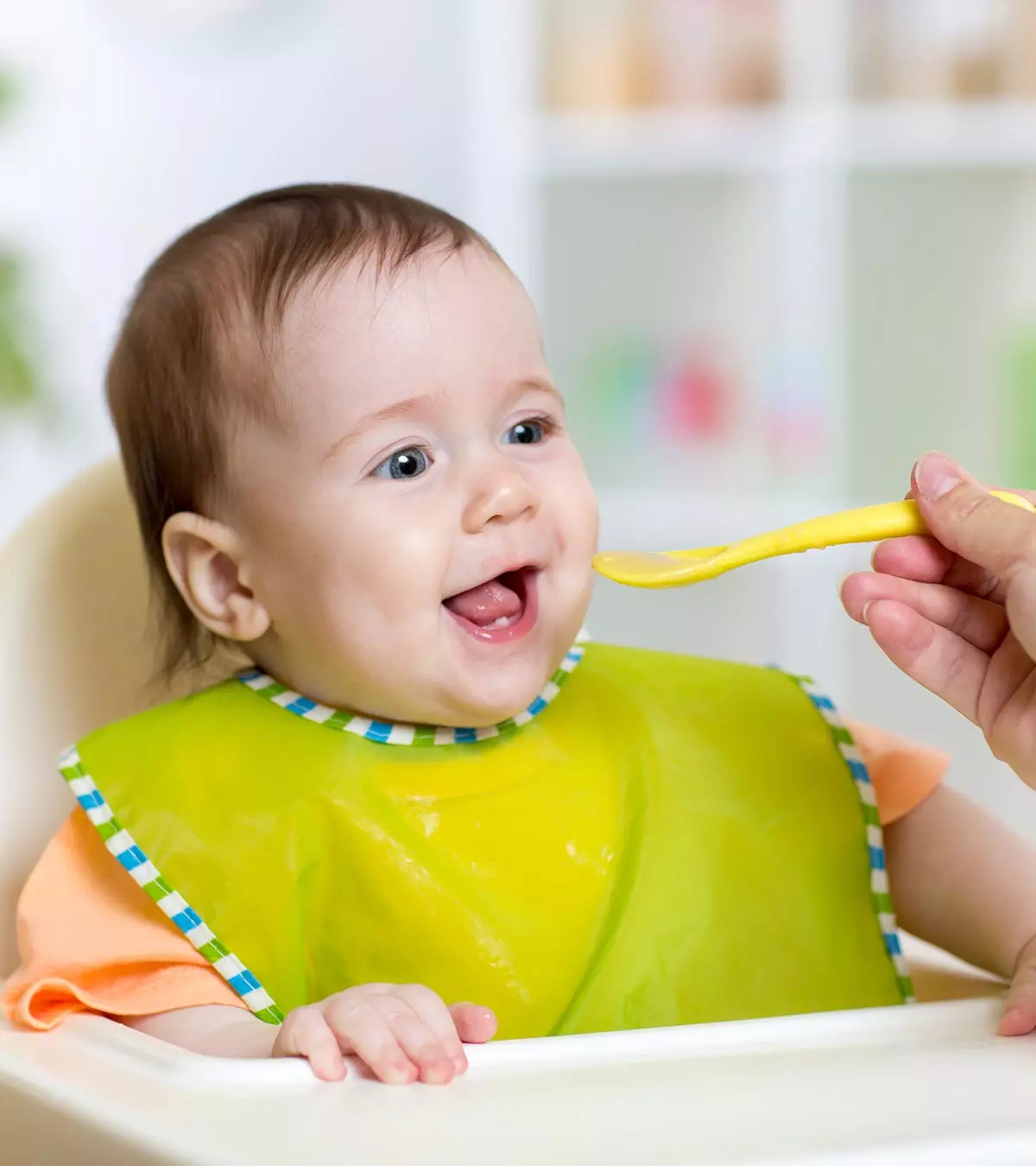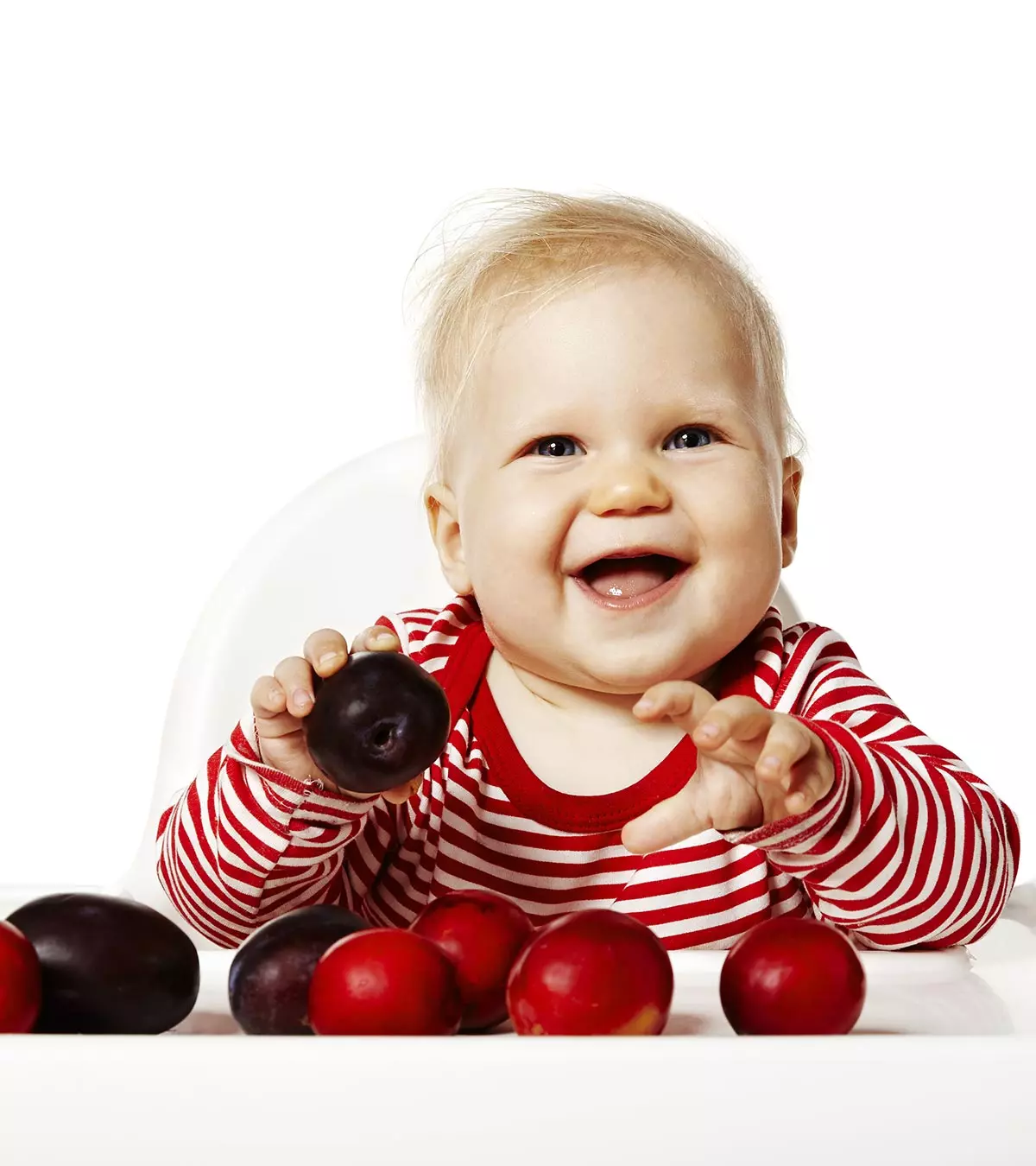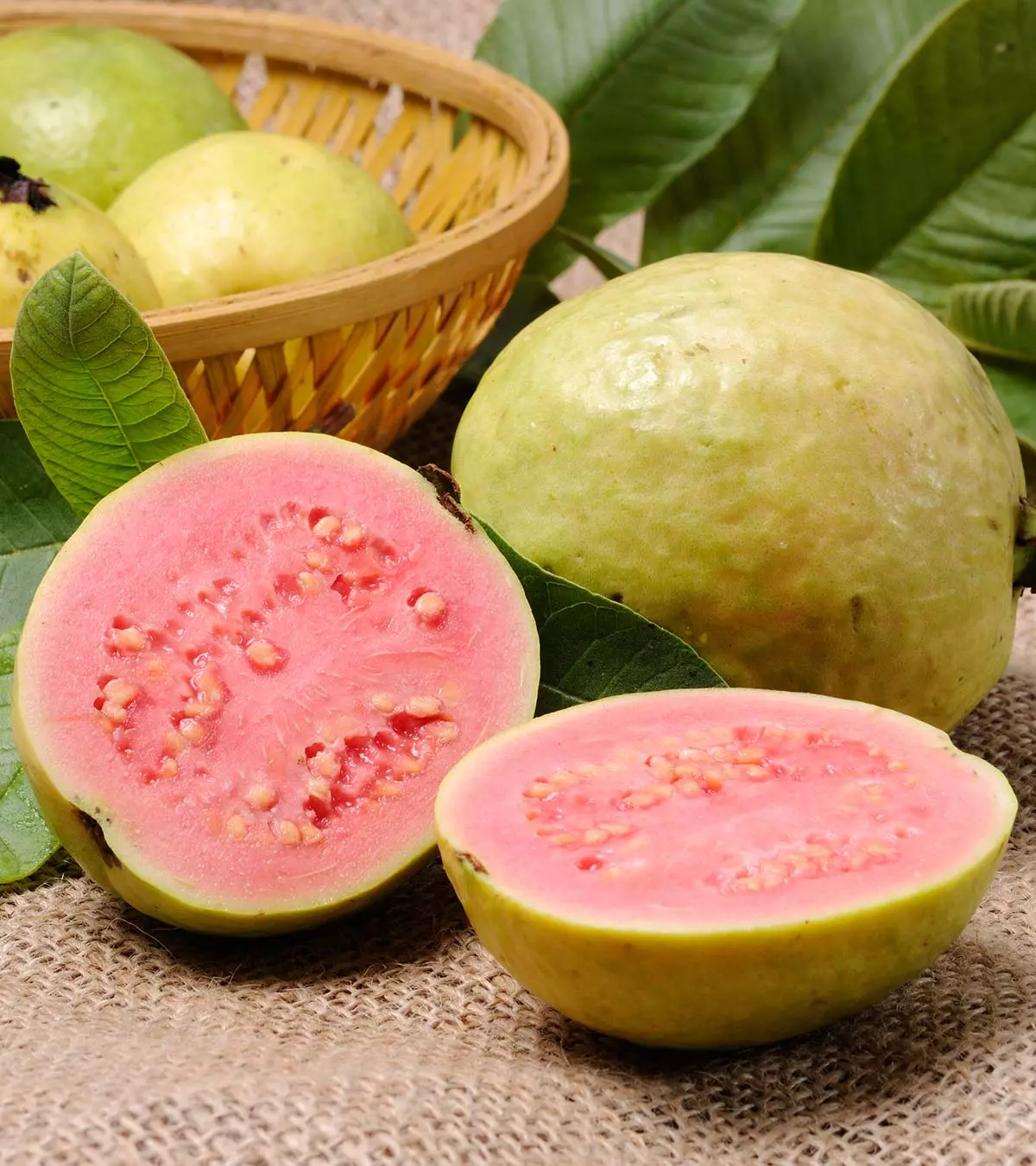
Image: ShutterStock
Muskmelons are among the many tasty and nutritious fruits mostly available in the summer months. There are numerous muskmelon benefits. Thus, you may consider having muskmelon in pregnancy to meet your daily dietary and prenatal nutrition requirements. The United States Department of Agriculture (USDA) suggests that women should consume two cups of fruits daily when pregnant, and muskmelons can be a good way to achieve the same (1). Call this fruit cantaloupe, rockmelon, sweet melon, or kharbuja, it remains sweet and tasty. It is nutritionally beneficial for pregnant women because of its high concentration of Vitamins A and C and potassium, among others. Continue reading this post to know more about eating muskmelon when pregnant, its health benefits, and the safest way to eat the fruit.

Key Pointers
- Muskmelons are a highly beneficial, nutritious, and delicious food during pregnancy.
- They have moderate calorie content, high nutritional value, and are rich in various vitamins and minerals.
- Muskmelons promote cognitive development, strengthen teeth and bones, prevent anemia, and help fight infections.
- The only reason to avoid muskmelons is the presence of the bacterium Listeria, which can cause stillbirth, preterm labor, and miscarriage.
- Before consuming muskmelons, scrub and wash the rinds thoroughly and wash your hands. It’s recommended to consume muskmelons immediately after cutting them.
Is It Safe To Eat Muskmelon During Pregnancy?
Yes, you can eat muskmelon but in moderation. They are extremely beneficial during pregnancy and provide the best of nutrients while catering to the taste buds. Moderate in calorie count and high in nutritional value, muskmelon is good for pregnant women. It is one of the best fruits to eat during pregnancy for the growth and development of your baby.
However, do not be surprised if your doctor tells you to avoid the fruit, as it could contain listeria bacteria on the outside. It is safe as long as you wash well, peel the outer cover, cut, slice and eat the inside pulp carefully.
So, why did we categorize this fruit as ‘to-be-eaten’?
 Did you know?
Did you know?Cantaloupe’s Nutrition Facts
Muskmelons contain the most vital components essential for the growth of your fetus. We advise you to add a decent amount of muskmelon in your weekly diet because 100 grams of muskmelon provides you with the following nutrition (2):
- Energy – 34 Kcal
- Carbohydrate – 8.16gm
- Protein – 0.82gm
- Fat – 0.18gm
- Sugar – 7.88gm
- Dietary fiber – 0.8gm
- NiaciniA water-soluble type of B vitamin necessary for the skin, nerves, and digestive system (B3) – 0.694mg
- FolatesiNaturally occurring form of Vitamin B9, responsible for protein metabolism and the production of red blood cells – 14µg
- CholineiAn essential nutrient needed by cellular function and the body for metabolism – 7.6mg
- Vitamin A – 232 RAE
- Vitamin E – 0.05mg
- Vitamin C – 10.9mg
- Vitamin K – 2.7mcg
- Potassium – 157mg
- Sodium – 30mg
- Calcium – 9mg
- Phosphorus – 17mg
- Iron – 0.38mg
- Zinc – 0.44mg
- Magnesium – 13mg
If you are asking, “How are these nutrients going to be helpful to me?”, then here is the answer.
Muskmelon Benefits During Pregnancy
The nutritional value of cantaloupe is immense. It balances fluids and electrolytes within the body and manages the body’s heat. The super advantages of having cantaloupe are:
1. Enhances baby’s cognitive development
Vitamin A is critical for the growing fetus to develop healthy cognitive functions and ward off any congenital disabilities. It supports the growth of your baby’s heart, lungs, kidneys, eyes and bones (3). Muskmelon contains a good amount of vitamin A. Being rich in folic acid, it also helps prevent neural tube defectsiSevere birth abnormalities of the central nervous system that develop early during pregnancy (4).
2. Helps in formation of healthy bones and teeth
Mulskmelons are considered among calcium-rich foods that help in forming healthy bone and tooth structures in your baby. Calcium is vital for both mother and child during pregnancy.
3. Prevents pregnancy anemia
Being one of the iron-rich foods, muskmelon helps in the healthy production of hemoglobin (5). A good count of red blood cells prevents anemia in pregnant women. According to the World Health Organization (WHO), in 2019, the global prevalence of anemia in women of reproductive age was 29.9% and 36.5% in pregnant women. It is therefore important to include iron rich foods such as muskmelon in your diet to avoid any iron-related pregnancy complications. Muskmelon is also known to improve the blood flow through the uterine cavity with sufficient oxygen for the baby.
4. Phosphorus induces muscle contractions
Phosphorus is essential for active muscle contractions during labor. It also helps in blood clotting, kidney function, nerve conduction, tissue repair and heart function.
5. Anticoagulant property
Muskmelons contain abundant anticoagulants, otherwise called blood thinners, which prevent the formation of blood clots
. The clots pose the risk of blood vessels blockage, kidney failure, and heart stroke in mothers. Muskmelon has the right amount of anticoagulants.
6. Fights common infections
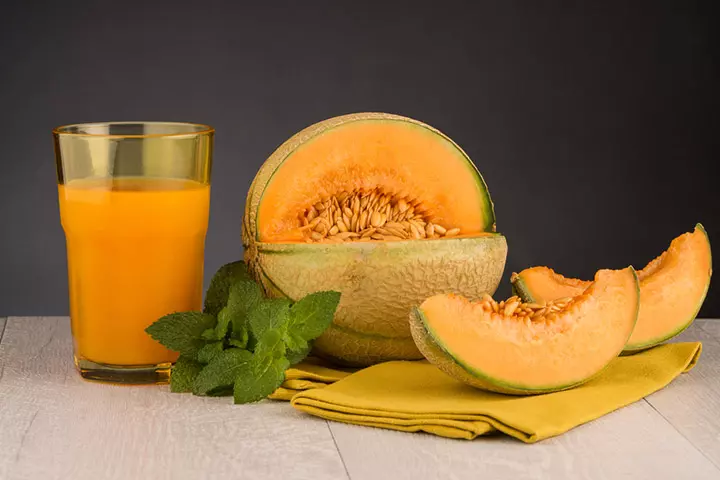
Image: Shutterstock
Vitamin C helps you to battle those annoying minor infections such as a cough, cold and flu during pregnancy by boosting immunity. This vitamin is also necessary for the growing baby to develop a healthy immune system. Drinking muskmelon juice in moderation may help meet your vitamin C intake requirements. Also, carotenoidsiPigments in plants, algae, and bacteria that give them their yellow, red, and orange hue (beta-carotene and lycopenei) present in cantaloupes can help strengthen the immune system of both the mother and the baby by fighting various life-threatening conditions such as cancer, making it part of several antioxidant-rich foods (6).
7. Treats constipation
The high water content in muskmelons prevents fluid and electrolyte loss from. Its coolant property manages the heat produced inside the body and thus provides relief from the common pregnancy problem of constipation, thus improving digestive health.
8. Vitamin B1 treats various issues
Thiamine or vitamin B1 helps in the healthy fetal development by aiding in the formation of the central nervous system while fighting several prenatal issues. The vitamin also helps control the extreme sense of nausea and morning sickness during the first trimester of pregnancy. It is also important for improving the quality of breast milk after delivery.
9. Regulates blood pressure levels
Potassium in cantaloupe regulates the fluctuating blood pressure levels through the course of pregnancy(7)
.
10. Ideal for overweight pregnant women
Overweight during pregnancy could pose a high risk of miscarriage, preterm labor, and high blood pressure. Muskmelon is a low-calorie fruit, so it is an excellent alternative for fatty foods. It is a fat and cholesterol-free substitute.
11. Aids in digestion
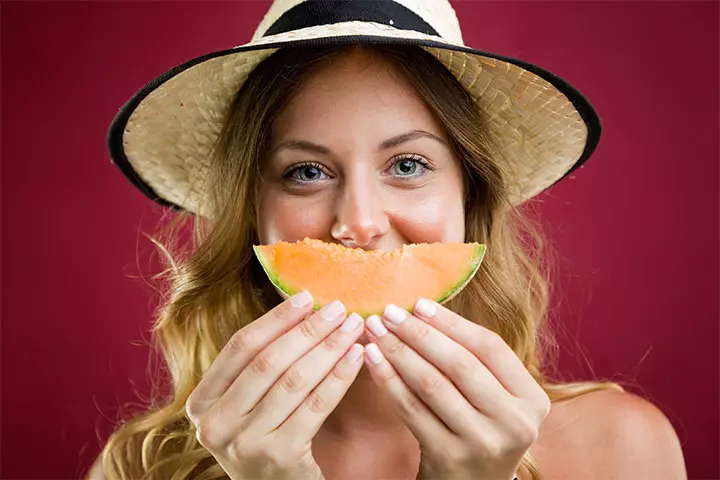
Image: IStock
Cantaloupe aids in the digestion of the food you take. It helps you stay away from heartburn, acidity, gas formation or any other digestive issues.
 Nutrition fact
Nutrition factAre There Any Side Effects Of Eating Muskmelon In Pregnancy?
Muskmelon does not pose any side effects or allergies unless you consume a pesticide-ridden fruit.
The only reason for the fruit to be “kept away when pregnant” is due to the bacterium listeria. In the year 2011, the US experienced a terrible listeria outbreak (8), and it was found that muskmelon was the source of the infection.
There are chances for the bacteria to enter into the fruit when cut, and can initialize the infection in pregnant women. If affected, listeria could lead to stillbirth, preterm labor, and miscarriage.
Then, what is the right way to eat the fruit?
Safe Way To Consume Cantaloupes
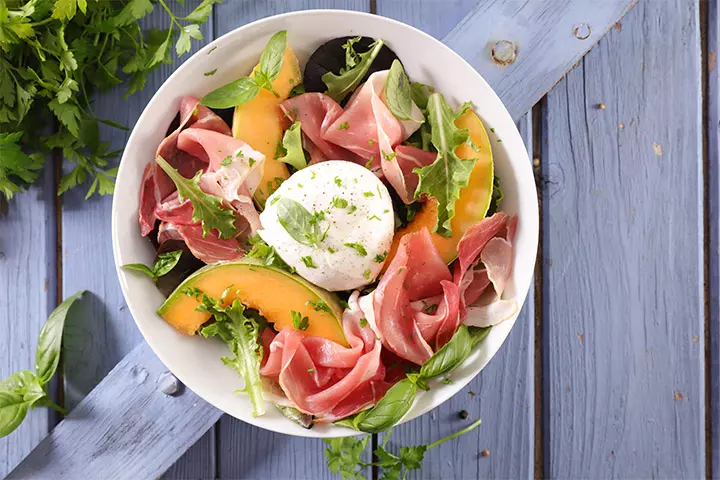
Image: IStock
Choose ripe and fresh muskmelons and avoid the ones that look damaged or smell strange. The fruit should be washed before you consume it. It would help in washing off food-borne diseases such as listeriosisiA serious infection caused by eating contaminated food, primarily affecting immunocompromised and pregnant population and toxoplasmosisiA parasitic infection caused by eating uncooked meat (9).
Scrub and wash the rinds before cutting the fruit. Also, wash your hands after handling the melons. Once cut, eat the fruit immediately, and avoid refrigeration for a long period.
Frequently Asked Questions
1. How much muskmelon can a pregnant woman safely consume?
Pregnant women are recommended to take about two servings of fruits per day. Muskmelon can be taken alone or with other fruits to fulfill the said requirement (12) (13).
2. Is there any nutritional difference between muskmelon and other melon varieties?
Melons may differ in their vitamin and mineral contents. Watermelons are high in lycopene (important for our cardiovascular and bone health). Cantaloupe contains vitamins A, B6, and C, potassium, dietary fiber, folate, niacin, pantothenic acid, and thiamine. Honeydew contains more vitamin C than cantaloupes (14). Casaba melons are also rich in vitamin C, vitamin B6, dietary fiber, vitamin K, potassium, and copper. Crenshaw melons add vitamin C, iron, and calcium to your diet (15).
3. Are there any potential drug interactions arising from consuming muskmelon during pregnancy?
Though no scientific studies state drug interactions with muskmelon, it may interact with the activity of blood thinners such as warfarin, as the melon contains vitamin K (16).
4. Can muskmelon help with morning sickness during pregnancy?
Muskmelons, like other fruits belonging to the melon category, are refreshing, cooling, and hydrating. They may help calm nausea and settle the stomach in some pregnant women experiencing morning sickness.
Also known as cantaloupe, sweet melon, kharbuja, and rockmelon, there are several benefits of muskmelon in pregnancy. These advantages include those supporting safe and healthy pregnancy in women while also benefiting the growing fetus to develop healthy cognitive functions. Muskmelon can be eaten fresh or in salads, puddings, and milkshakes. Although it is completely safe to consume muskmelon while pregnant, eating an infected pesticide-laden fruit might have detrimental effects on the baby. Therefore, before eating muskmelon, scrub and wash your hands and the fruit and try to eat a fresh one.
Infographic: Muskmelon Recipes To Try During Pregnancy
Muskmelons are delicious but eating the fruit the same way every day may feel uninteresting. So, here are some muskmelon recipes that are quick to make and fill you up with instant energy and freshness. Illustration: Momjunction Design Team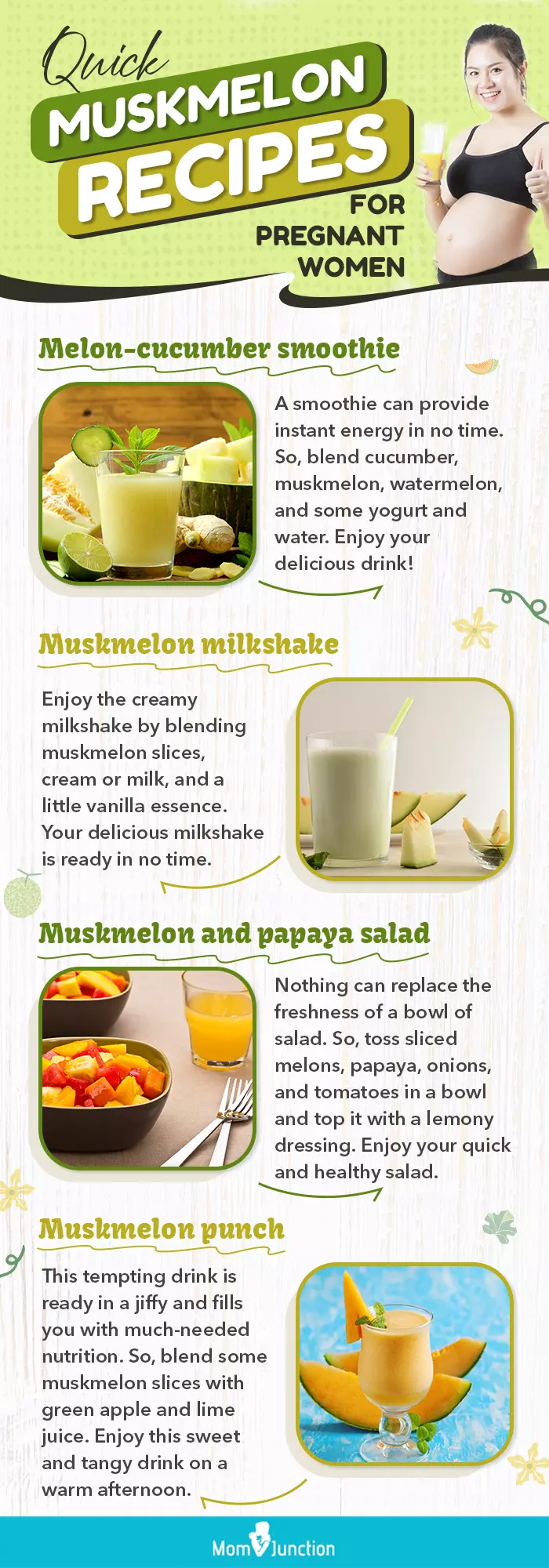
Illustration: Is It Safe To Eat Muskmelon In Pregnancy? And How To Eat?

Image: Dall·E/MomJunction Design Team
References
- Nutritional Needs During Pregnancy and Breastfeeding.
https://ohioline.osu.edu/factsheet/HYG-5573 - Cantaloupe raw; FDC ID: 1102655.
https://fdc.nal.usda.gov/fdc-app.html#/food-details/1102655/nutrients - Vitamin A and Carotenoids Fact Sheet For Professionals.
https://ods.od.nih.gov/factsheets/VitaminA-HealthProfessional/ - Folic Acid: the Vitamin That Helps Prevent Birth Defects.
https://www.health.ny.gov/publications/1335/ - Iron Fact Sheet For Professionals.
https://ods.od.nih.gov/factsheets/Iron-HealthProfessional/ - Carotenoids.
https://lpi.oregonstate.edu/mic/dietary-factors/phytochemicals/carotenoids - Vitamins.
https://lpi.oregonstate.edu/book/export/html/46 - Kelly A. Walsh et al.; (2015); Outbreaks Associated with Cantaloupe Watermelon and Honeydew in the United States 1973–2011.
https://www.ncbi.nlm.nih.gov/pmc/articles/PMC4627691/ - Fruits Veggies and Juices from Food Safety for Moms to Be.
https://www.fda.gov/food/people-risk-foodborne-illness/fruits-veggies-and-juices-food-safety-moms-be - Cantaloupe.
https://www.clevelandmetroschools.org/cms/lib05/OH01915844/Centricity/Domain/91/FRUIT-%20CANTELOPE.pdf - Cantaloupe.
https://diabetes.org/food-nutrition/reading-food-labels/fruit - Pregnancy: Nutrition.
https://health.clevelandclinic.org/pregnancy-diet - Nutrition During Pregnancy.
https://www.hopkinsmedicine.org/health/wellness-and-prevention/nutrition-during-pregnancy - Melons honeydew raw.
https://fdc.nal.usda.gov/fdc-app.html#/food-details/169911/nutrients - Summer melons.
https://www.medicalwesthospital.org/summer-melons.php - Vitamin K.
https://ods.od.nih.gov/factsheets/VitaminK-HealthProfessional/
Community Experiences
Join the conversation and become a part of our nurturing community! Share your stories, experiences, and insights to connect with fellow parents.
Read full bio of Jyoti Benjamin
Read full bio of Swati Patwal
Read full bio of Rebecca Malachi
Read full bio of Aneesha Amonz






